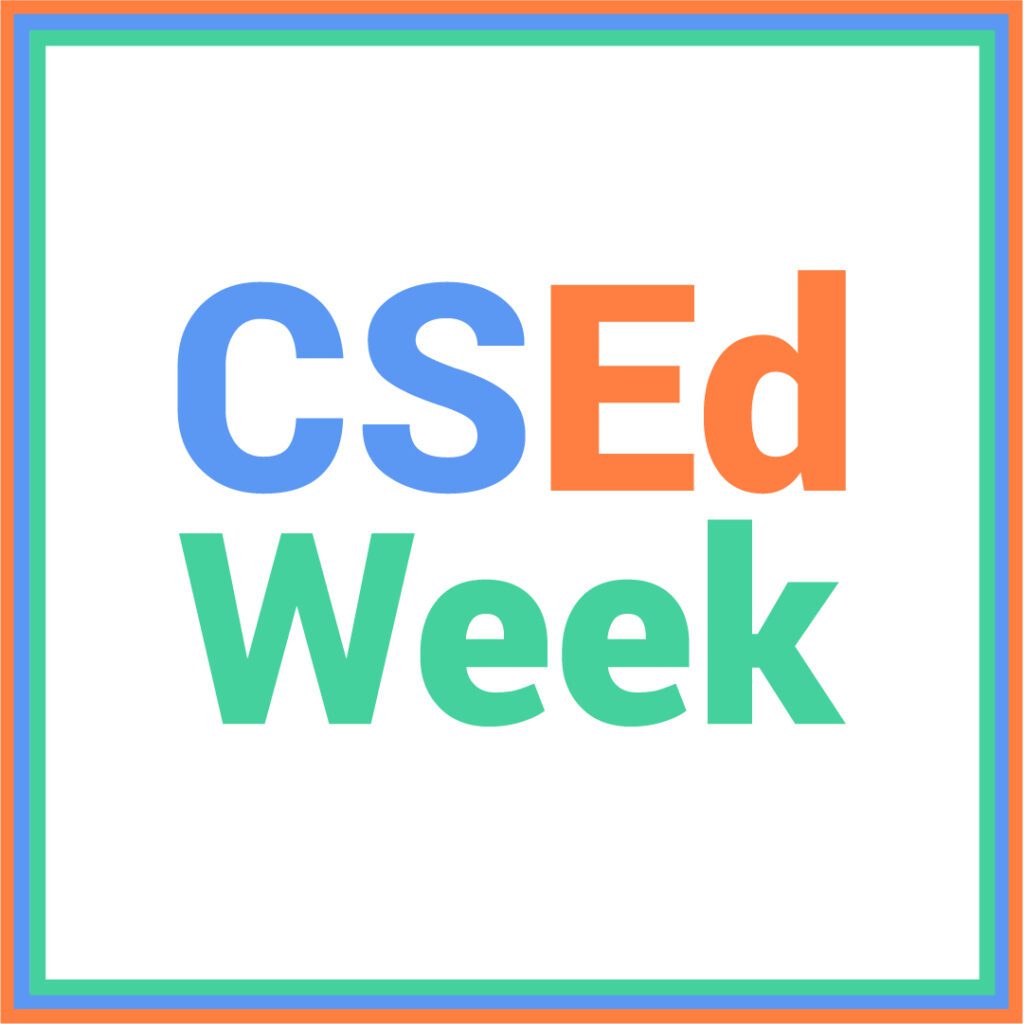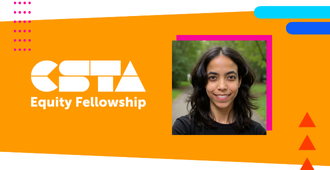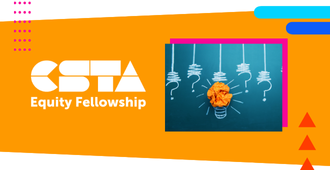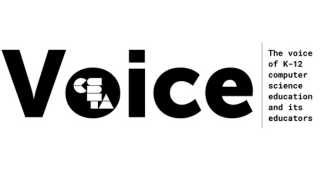
CSEdWeek 2022 just concluded, and millions of students around the world celebrated with an Hour of Code, or perhaps even participated in weeklong programming where teachers introduce coding in their classrooms.
Full Story
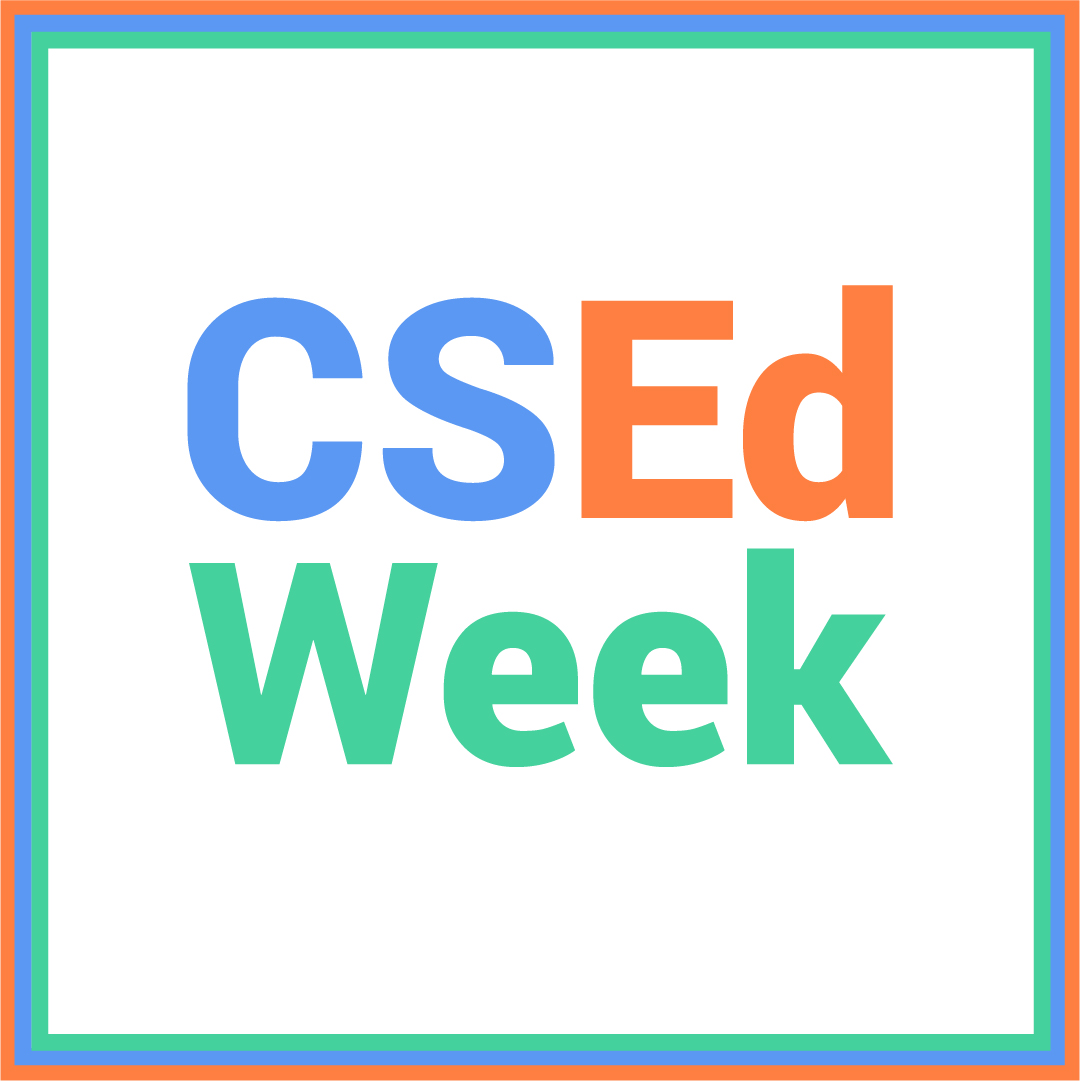 CSEdWeek 2022 just concluded, and millions of students around the world celebrated with an Hour of Code, or perhaps even participated in weeklong programming where teachers introduce coding in their classrooms. For many students, was is the first, and often only, experience they will have with computer science (CS) this school year. While we understand that students love learning to code-embracing creativity and leading with curiosity to problem-solve (Resnick, 2018)-many educators struggle to integrate CS skill-building into their subject area. Between grade-band expectations and state-level requirements, finding ways to embed CS can feel overwhelming.
CSEdWeek 2022 just concluded, and millions of students around the world celebrated with an Hour of Code, or perhaps even participated in weeklong programming where teachers introduce coding in their classrooms. For many students, was is the first, and often only, experience they will have with computer science (CS) this school year. While we understand that students love learning to code-embracing creativity and leading with curiosity to problem-solve (Resnick, 2018)-many educators struggle to integrate CS skill-building into their subject area. Between grade-band expectations and state-level requirements, finding ways to embed CS can feel overwhelming.I can share a multitude of studies that point to the success of introducing CS through innovative pedagogies using a project-based learning approach (Cobo & Montaldo, 2018), or through the integration of computational thinking across subject areas (VÃzquez Uscanga, Bottamedi, & Brizuela, 2019), and even through makerspaces (Nesen, Fowler, & Vegas, 2021) to develop not only the deep analytical skills associated with computing but also the skills that are relevant more broadly for a life filled with possibility.
But will that inspire you to host an Hour of Code to spark the joy of learning in your students, or perhaps plant a seed that a week of CS activities may blossom into an exploration of previously unconsidered career pathways by students? What if I take it a step further and try to convince you to integrate CS throughout the school year?
Wait, what did she say? How did we go from one hour to one year of CS?
What if I offer help to teachers who already feel stretched to the limit to easily integrate CS in subject-area classrooms this year?
Stick with me, and I’ll share complimentary, ready-to-teach lessons aligned to national standards that address core critical thinking and literacy competencies. I’ll put you on a practical path to discover how to introduce computational thinking in your lesson plans. And, I have created a compendium of free CS resources that include coding activities, curriculum, and collaborative competitions you can access at a click to share with your students each month for the next year.
Let’s get started!
Free Lessons Aligned to National Standards
Oftentimes, the biggest obstacle to introducing CS across subject areas is lesson planning. The lift of creating a lesson aligned to national standards, as well as the time needed to create student resources, is daunting. Guess what? The lessons below are plug and play! Moreover, they are designed for educators without a CS background. That said, I haven’t forgotten our CS experts. There are extensions and modifications directly tailored for you. These unique lessons offer connections to help CS come alive in English, social studies, math, science, and more!
- Fuzzy Friend Speaks (Grades K-2) from AVID STEM Connections® on AVID Open Access⢠(AOA): Using a fuzzy friend, students will be introduced to algorithmic thinking and following sequential steps.
- Animate Your Name (Grades 3-5) from BootUp PD on AOA: In this introductory Scratch project, students will create their name using letter sprites and use code to animate each letter when clicked.
- Apps and Storage (Grades 6-8) from Code.org on AOA: Students will learn how a smartphone uses information to solve complex problems by looking at the types of input that may be needed to solve a particular problem.
- Chase the Pizza (Grades 6-12) from Microsoft MakeCode on AOA: Engage students in coding by having them create a simple game where one sprite tries to catch another and earn as many points as possible before time runs out.
Introduce Computational Thinking Across Content Areas
While we all agree that computational thinking is a fundamental life skill, we haven’t arrived at a place where its instruction has been standardized as a core literacy along with reading, writing, and math. The following resources are meant to serve as a gentle introduction to implementing computational thinking as a foundational literacy for all students.
- Demystify Computational Thinking is a collection of AOA articles and graphic organizers you can share with students to unpack the four foundational skills of computational thinking: abstraction, algorithms, decomposition, and patterns.
- Computer Science Education Week and the Importance of Computational Thinking, with Kiki Prottsman is an Unpacking Education podcast episode where Kiki, a champion for responsible computing and equity in CS, shares practical strategies for introducing computational thinking to help students develop lifelong problem-solving skills.
Free Monthly Coding Activities and Curriculum
Ready to dive into what the CS Ed world has to offer you and your students throughout the year? The following are free resources that include short activities, units of study, and curriculum you can use to meet the diverse learning needs and interests of your students.
- December: Let’s begin with a one-hour Hour of Code tutorial. You can choose from a pre-reader experience with CodeMonkey Jr.; or NASA’s Space Jam to learn about music, astronomy, and coding; or even an action-packed Black Panther Wakanda Forever experience. And this is just the start. With hundreds of activities to choose from, use the drop-down menus to find lesson plans and self-led tutorials to best meet your students’ needs.
- Grades: K-12
- Language: Unplugged, Blocks, JavaScript, Python, CSS, Language Independent, and more
- January: Welcome your littlest students back from winter break with fun and engaging projects that introduce foundational coding concepts on a simplified and block-based coding platform, ScratchJr, with BootUp PD. Here, you will find open-source resources to engage students in equitable CS programs for all. Check out their curated collection of over 100 unplugged lessons to teach core computational concepts and practices without using devices.
- Grades: K-2
- Language: Unplugged, Blocks
- February: Let’s celebrate Carnival! Well, not Mardi Gras, rather MakeCode’s Code a Carnival. While the Ferris wheels and cotton candy of summer fairs may be months away, students can bring the festive vibe of “carnival” into the classroom by building such classic games as Whack-the-Mole and Burstin’ Balloons-no hardware or downloads required. Along with guided tutorials, Code a Carnival provides a free, easy-to-use teacher resource guide.ââ
- Grades: 2+
- Language: Blocks
- March: Why not lead into spring break with Live Coding lessons from the MakeCode for micro:bit dynamic father-son team, Pele and Emile. They’ll help students learn to code in the MakeCode micro:bit online editor. A micro:bit isn’t required to take advantage of these how-to-build-awesome-games video tutorials.
- Grades: 5+
- Language: Blocks, JavaScript, Python
- April: It’s National Poetry Month! Help students learn to build a poem-generating program in the Coding with Poetry module from Code.org.
- Grades: 4-8
- Language: Blocks
- May-June: Looking to inspire your students to become the innovative problem-solvers of the future? May is National Inventors Month-the perfect time to introduce the Congressional App Challenge! Students learn to code and explore careers in CS, while working collaboratively to develop an original app for this prestigious national competition.
- Grades: 6-12
- Language: C, C++, JavaScript, Python, Ruby, Blocks
- July-August: Summer break doesn’t need to mean summer slide. Use creative coding to keep students engaged with learning while documenting their summer adventures with storytelling in Scratch! To help students get started on their project, explore the Educator Guide. Throughout the summer, students can explore tutorials on topics of interest. They can also create a story, animate an adventure game, and even create animations that talk!
- Grades: 3+
- Language: Blocks
- September: It’s time to build relationships and create community in your classroom. These Scratch lessons by BootUp PD help build relational capacity, while you learn more about your students’ personal stories. Use this time to introduce digital citizenship with Common Sense Education. Explore their lessons and add a CS spin by having students create an animated public service announcement in Scratch for students two grades lower. What a great way to introduce empathy-driven design, feedback loops, and iterative problem-solving to start the year with a student-centric classroom!
- Grades: K+
- Language: Scratch
- October: Get in on all the action with Cybersecurity Awareness Month. If you’re looking for a fun way to have students learn more and advance their skills, consider CyberStart America, an immersive cybersecurity training game for high school students. Register for this yearly competition where students are awarded scholarships based on their completion of the levels on the platform.
- Grades: 9-12
- November: With Minecraft: Education Edition’s Escape Estate, it isn’t too late to embrace the “Boo!” of Halloween. Engage students in block-based coding with MakeCode, or text-based coding with Python, to unlock secrets of a mystery mansion while discovering the power of computational thinking. Get started with this lesson plan and video walk-through.
- Grades: 3+
- Language: Blocks, Python
- December: I’ll see you back here for CSEdWeek 2023! I’m looking forward to hearing how your trip around the sun with CS in your classroom impacted the learning experience for you and your students!
As you can see from the resources curated here, EdTech, content developers, and nonprofit organizations are coming together to continually create complementary resources across grade bands and platforms to meet the diverse needs of your students and your learning environment. Finding what fits may seem like a gargantuan task, but we’re here to provide support, inspiration, and encouragement, to spark the joy of learning in your students by challenging them to engage in rigorous and creative problem-solving with computational thinking and CS Ed. Reach out to the CSTA Equity Fellows at equityfellows@csteachers.org. We are educators and instructional allies committed to bringing equitable access to and achievement in PreK-12 computer science.
References
Cobo, C., & Montaldo, M. (2018). Plan Ceibal in Uruguay: How do you educate in learning to decode the unknown? Current and Critical Issues in Curriculum, Learning and Assessment, 26, 1-16.
Nesen, Y., Fowler, B., & Vegas, E. (2021). How New Brunswick implemented its computer science education program. Center for Universal Education at the Brookings Institution, 1-16.
Resnick, M. (2018). Lifelong kindergarten: Cultivating creativity through projects, passion, peers, and play. The MIT Press.
Vázquez Uscanga, E. A., Bottamedi, J., & Brizuela, M. (2019). Pensamiento computacional en el aula: el desafÃo en los sistemas educativos de Latinoamérica. RIITE, 7, 36-47.
About the Author
 Dr. Michelle Magallanez is the Director of Special Projects, the innovation incubator at AVID Center, a national educational nonprofit with the mission to close the opportunity gap for all students by helping them build the skills they need to be future ready. She is a proud Mexican American with a PhD in French Medieval Literature from NYU, who to this day continues to work on her math phobia. Third grade multiplication tables were a surprise! She is also an award-winning EdTech interaction designer who has created game-based learning experiences for children and adults in a career that included stints at LeapFrog and leading a studio at Allen Interactions where she advised Fortune 500 Companies. Her path to a CS-related career has been windy. Her role at AVID Center allows her to positively impact students under-represented in CS, helping to make their path to a future filled with possibility a bit less scenic than her own. With 20+ years of experience in product and program development, Michelle’s work currently focuses on designing professional learning and curricular resources in partnership with EdTech companies for K-12 content area teachers new to CS and STEM. Her mission is to build resources for the implementation of computational thinking, CS, and STEM problem-solving in content-area classrooms as foundational learning skills for all students.
Dr. Michelle Magallanez is the Director of Special Projects, the innovation incubator at AVID Center, a national educational nonprofit with the mission to close the opportunity gap for all students by helping them build the skills they need to be future ready. She is a proud Mexican American with a PhD in French Medieval Literature from NYU, who to this day continues to work on her math phobia. Third grade multiplication tables were a surprise! She is also an award-winning EdTech interaction designer who has created game-based learning experiences for children and adults in a career that included stints at LeapFrog and leading a studio at Allen Interactions where she advised Fortune 500 Companies. Her path to a CS-related career has been windy. Her role at AVID Center allows her to positively impact students under-represented in CS, helping to make their path to a future filled with possibility a bit less scenic than her own. With 20+ years of experience in product and program development, Michelle’s work currently focuses on designing professional learning and curricular resources in partnership with EdTech companies for K-12 content area teachers new to CS and STEM. Her mission is to build resources for the implementation of computational thinking, CS, and STEM problem-solving in content-area classrooms as foundational learning skills for all students.

